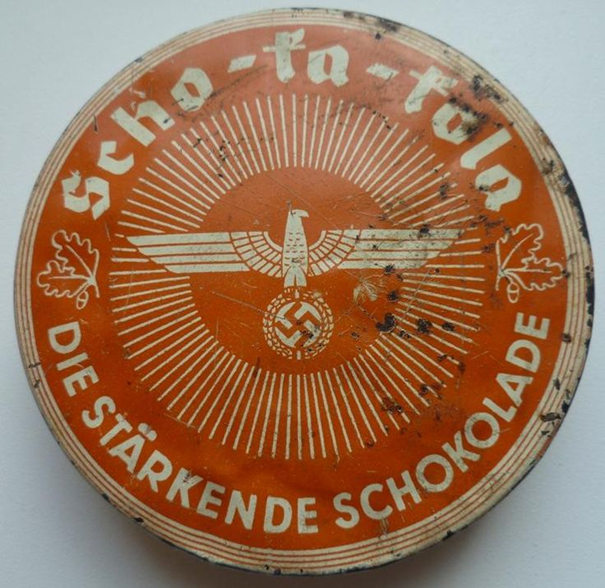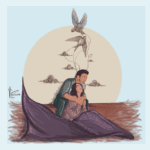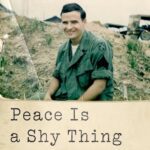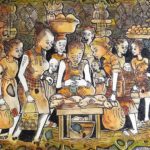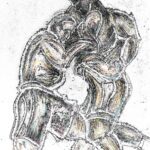“How did you escape? You just, like strolled out of there?”
“No, I didn’t. It was the company that strolled out.”
“And you didn’t go with them.”
“I didn’t go with them, no.”
“Didn’t they look for you?”
“I didn’t exactly make enquiries about that. I didn’t go running back to see if they were looking for me. You think I’d go chasing after them, shouting ‘Wait for me! Don’t leave me behind!’?”
“It was a smart move, at any rate.”
“No, it wasn’t. It was the stupidest thing I could have done!”
“But lucky for you in the end!”
“Yeah, lucky for me in the end. That I was such a moron. Such a complete and utter moron.”
“What would’ve become of you, if you hadn’t got away? What became of the rest of them?”
“I met one of the guys after the war and he says ‘You’re alive?’ ‘And what’s new with you?’ I ask him. He told me it had been hell, what had gone on. That we’d been the … Not the punishment company, but something … the bone company, or something like that. He didn’t talk about it much.”
~
It’s after midnight when I slip out of our quarters. I’m prepared. The treasures I’ve been collecting for so long are in my backpack: cans of food, two packets of cigarettes, bacon, dry bread and the pressed coffee-substitute I stole from the field kitchen when I was going over the pass. A canteen, a spoon. A penknife in my pocket. I leave the village by the back ways and run across the meadow to the dark woods on the hillside. This too, I’ve had planned for a long time; how I’ll cut through the woods and keep going till I reach the edge of the next village, the one they say is called Delatyn.
For an hour and a half or two hours, I push my way through the undergrowth. Suddenly, the trees thin out and in the darkness I can make out a grey, winding road and a small group of houses. I’m not sure what to do. I camp down, and shiver as I wait for morning. At first light, I swallow a little of the coffee-substitute, wash it down with a mouthful of water from the canteen, get to my feet and go down to the road.
At the edge of the road, I stop. I look around carefully. From the left, a cart comes into view as it rounds the bend. It’s being pulled by a scrawny old nag. An even scrawnier old man sits on the box, wearily dangling a whip. From the right, two women are approaching with a child on the far side of the road. I decide to wait until the cart has gone past me, but just then, soldiers appear from behind it. The cart has hidden them from view up till now.
Incredibly, I’m not scared. My confidence that this will all go smoothly is unshaken. I will succeed, everything will be fine. I’ll soon be fighting with a medal on my chest, and I’ll die a hero’s death. I am entirely convinced of all of this. If I’m scared of anything, it’s that I’ll be caught by the Hungarians, that they’ll catch me and, instead of shooting me dead right away, they’ll take me down to Sátoraljaújhely or somewhere and put me in front of a military tribunal, and then hang me. I’ve heard about such things.
It’s too late to jump back now; it would draw attention. I start off for the other side, walking confidently, but not too quickly. When I get across, the women and the child are just level with the soldiers coming after the cart. I bend over as if I’m having trouble with my bootlaces, and peer up very cautiously. A German patrol. One of the soldiers looks at me, notices my yellow armband, turns back to the other two with a bored expression and they go on.
Have I got away with it? For the time being. I pick one of the shingle-roofed houses. I go up to the gate in the fence. I try the latch. It’s open. I go around the side. That’s where the entrance is, under the porch. I knock and wait. In one of the windows, a curtain is drawn back. Someone looks out. Then there’s the sound of shuffling. The door opens and there before me is a middle-aged man with a moustache. I greet him in Russian. He mutters something back, and just stares hard at me.
“I’m looking for the Russians,” I tell him. “Where are they? I want to go over to them.”
From further in, a door creaks, and there are muffled voices. The Ukrainian is still just standing and staring at me. He says nothing. Then he shakes his head and pulls me into the house by the arm. He offers me a chair and we sit down. I reach into my backpack and take out the packet of tobacco. I hold it out to him.
“Thank you,” he says.
“I’m running away. I want to go over to the Russians,” I say again. “Which way should I go? Can any of you help me? Please help me.”
It’s crazy, what I’m doing, but I don’t feel the least bit afraid, even though this man could simply hand me over to the German or the Hungarian military authorities. And does he have any idea what the yellow armband means, I wonder? They say the people round this way aren’t terribly fond of Jews, and they like drifters even less. They say that after the Germans arrived there was some crazed killing hereabouts. Though, if I heard right, that was organized by the SS. But that’s not what I’m thinking about. It doesn’t even enter my head. All I’m thinking is that I’m running away and so far nothing has gone wrong.
“I’ll give my son a shout,” says the Ukrainian.
Here’s the boy already. I didn’t hear him come out. He’s a big lad, round-faced and blonde, can’t be more than nineteen.
His father says something to him in Ukrainian about the Russians. I don’t really understand it.
The boy doesn’t ask any questions. He nods.
“We can go,” he says in Russian. “But take that off first,” he says, pointing at my armband. “And your cap too.”
I stuff them both in my pocket. We set off. We head towards the wooded hillside, then on, northeast through the woods.
“Are you a Jew?” asks the boy.
“Yes, I am,” I say.
“You don’t look like one.”
“My mother is Russian.”
“Is that why you want to go over to them?”
“I want to fight. Against the Germans.”
“Aha,” says the boy. “Well, you know best.”
Half an hour later, we come out of the wood. Another valley opens up before us; hillside, fields, open land, a few houses down below. The boy scans the slope opposite, screwing up his eyes.
“Look!” he says suddenly, and points.
I can see them too, tiny figures on the move, inching forward in a strung-out line.
“Military police,” he says.
We watch. Behind the hill there’s a sudden rumble.
“And that’s the Russians,” he says, pulling back towards the trees.
“You’re supposed to be taking me across.”
“No, I’m not,” he shook his head, “I’m only showing you where they are.”
“I know where they are,” I say angrily. “I’m not stupid.”
“I’m not going any further,” he says, digging in his heels.
A wave of anger washes over me. I grab his jacket and shake him.
“If you don’t take me any further, I’ll cut your throat!” I hiss.
He gets a grip on my arm and tightens it. I tighten my grip too and we look daggers at each other.
“If they catch us, they’ll kill me on the spot,” he bursts out at last, and lets me go.
I let him go too.
“Who will?” I ask.
“The Germans,” he says. “The Russians.” He wriggles half-out of his jacket and pulls up the left sleeve of his shirt to the armpit. “See that?” He shows me the tattoo on his upper arm.
A blood group letter code and an SS identity number. Aha. I’d heard about that.
“I ran away too,” he said. “They’ll shoot me dead if they catch me. I’m going back. Wait here till the MPs have gone.”
He takes something out of his pocket and presses it into my hand. A German army compass.
“There,” he says. “This is for you. It’s a really good compass. Maybe you should wait till evening. You can get round that way, through the woods. Good luck!” he waves and is gone.
~
“That Ukrainian boy, the one who’d run away from the SS. Why did he help you?”
“How should I know?”
“And what happened to him after that?”
“He went home.”
“He must have been killed, that’s obvious. Either by the Germans at that point, or by the Russians later.”
“I have no idea what happened to him.”
“One can speculate.”
“If you say so, but personally that’s not something I did.”
I clamber into a thicket, and crouch at the foot of a tree. Birdsong, the drone of an airplane, the far-away rumble of cannon. I open a can of food. What should I do? Wait until I think the coast is clear and cut across the valley alone? I may have a pretty good idea which line of hills the frontline is crouching behind, but I have no way of knowing what conditions are like on the ground or how the situation may change… Or should I head towards the mouth of the valley through the woods, a long detour to the west? Around noon I pull myself together and set off through the woods. I throw the compass away; being caught with that is all I need. There’s a path of sorts, but I don’t look to see where it leads: I’m heading towards the irregular, muffled rumbling. It’s getting dark by the time I make it through the woods to the top of the next line of hills, and see the new valley stretching out below the thinning trees.
There are a few houses down there, no people anywhere. I cast around me, and am just setting off towards the houses when, about five or six hundred meters above me, on my left, I catch sight of a mountain artillery position and soldiers moving about. I throw myself down on my stomach and then start to slither, commando-style, still making for the houses. It’s not clear if the artillerymen are German or Hungarian, but they seem to be in the mood for a bit of fun, as twice they blast in my direction, to no avail, of course. They don’t bother sending a man after me.
After a great deal of effort, I reach the first wooden house in the line. I knock. An old man opens the door cautiously and shuts it again quickly behind me. Inside it’s gloomy and there’s a heavy smell. A stove, with something cooking on it. Standing by it is a woman in a headscarf, who gives me a startled look.
“Where are the Russians?” I ask the old man in Russian.
He sizes me up.
“At Kolomyia,” he replies eventually. “Four or five kilometers from here.”
“I want to go over to them,” I say stubbornly, and take out the other packet of tobacco. If he hands me in, he hands me in.
“You can stay here till morning,” nods the man of the house. “By then that lot over there might be gone.” He jerks his head towards the window and the hillside. He puts the tobacco away, then starts to size me up again.
“Take off your jacket. I’ll give you another one.”
While I’m getting out of my jacket, he starts looking at my coveralls.
“Take those off too,” he says.
With a heavy heart I slip out of those as well. The old man bustles about, bringing me a pair of shabby pants and a shirt, and a grey cloth coat full of louse-eggs. I have no idea, of course, that it is louse-ridden. It is only later, unfortunately, that I realize I should have suspected as much. I change into the clothes, and we sit at the table. Dinner is millet porridge with pieces of bacon, and a few potatoes. We eat, saying little. Pretty much all I find out is that when their son went to join up, it was still the Red Army recruiting. It’s been a year and a half since they had any news of him.
“Where have you come from?” the old man asks without warning, putting the question after all.
“From Hungary. But I’m Russian,” I add for the sake of simplicity.
“You’re Russian?” they ask, surprised.
“My mother is.”
“Ah, your mother.”
“I want to go over to them.”
The old man shakes his head, and humphs. His wife heaves a big sigh, then wipes her eyes and seems to brush something away with her hand.
“If only it were all over.”
They let me sleep in the larder. They give me a sack of straw and a blanket. I go out like a light.
~
“That German patrol didn’t want to arrest you?”
“No.”
“Why not? They didn’t even ask you who you were?”
“They could see who I was.”
“How could they see that?”
“I was in civvies.”
“You could have been a local, for all that. Or any kind of deserter. It wouldn’t have been obvious that you were in the Hungarian Labor Service.”
“Yes, it would.”
“How?”
“The yellow armband.”
“You kept that on all the time, like you were supposed to?”
“Sometimes I did.”
“So, you got the lice-ridden clothes from the Ukrainians and pulled your yellow armband on over them?”
“I got the clothes later.”
“And after that, you didn’t pull the armband on over them?”
“I can’t remember.”
“Why did you put it on in the first place?”
“Why did I put it on in the first place? I felt safe.”
“But you were a deserter!”
“Yes, but I was in the Ukraine. What did they know about that in the Ukraine …”
“You wanted them to see … that you weren’t SS or a soldier on active service?”
“With the yellow armband on I felt safe. But later I took it off.”
At dawn, the old man shakes me awake. He offers me tea in the kitchen. I drink it, reach for my backpack and swing it onto my back. I’m ready to leave.
The old man watches me, nodding, then seems to waft away his reservations with a sweep of his hand.
“Nu, charasho. God bless you.”
We shake hands in farewell.
“Thanks for everything,” I say, and step out into the damp half-dark.
I hurry across the road that runs down the valley and, scrambling up the slope opposite, plunge into the woods again, intending to skirt this hill too. I’ve been pushing my way through the undergrowth for a good while and am just beginning to realize that I have lost my way, when I reach a clearing. There’s a footpath going across it.
Just then, I hear, “Halt! Hände hoch!” And, “Hands up!” in Hungarian.
A mixed patrol steps out from over by the path. There are five of them; two German SS and three Hungarians. They point the barrels of their guns at me. Oddly, I am not scared. I have been expecting this. I put my hands up high.
“Wo kommst du her?” asks one of the SS and looks suspiciously at my Ukrainian rags. I’m clearly not a partisan, but can scarcely be a local out on a hike either, and not just because of the first-class backpack I’m carrying.
“Ich bin Ungar,” I say quickly. “Arbeitsdienst,” I add. “Fifth Public Interest Labor Service Battalion, Third Company,” I report to the Hungarians as well.
One of them, a spunky sergeant with a Clark Gable moustache is already waving the other two back and coming towards me.
“Now then, my little friend,” he says. “You’re coming with us, then.”
He makes me take off the backpack, feels around in it, then frisks me.
They’re going to shoot me, I think. Is this it? Yes, most likely, this is it.
“Was hast du bisher gemacht?” asks the German who spoke before. He’s a big guy, with a broad face and fleshy eyelids. Going by his shoulder boards and the number of stripes on them, and also what I’ve picked up from Signal, I judge him to be a sergeant too, or as the Germans say, a junior squad leader, an Unterscharführer. His Hungarian colleague is taken aback and stares dumbly. He doesn’t understand the question: what have I been doing up to now?
“Minen gelegt,” I answer.
“Minen gelegt?” He looks me up and down curiously and nods. Yes. I’ve been laying mines. He shoots a meaningful look at his companion, affably pushes aside the Hungarian sergeant and takes my arm.
“Du kommst mit uns,” he says firmly.
This decision, that they need me, he makes various efforts to communicate to the three Hungarians, until they somehow grasp what he is saying. They return my backpack to me and we’re ready to go.
I’m beginning to understand that somehow or other, I have again been lucky with these Germans. That they’re still not going to shoot me, at least for the time being.
“Na, los,” says the Unterscharführer, waving us on.
The two Germans take charge of me and we move off back along the woodland path.
“Bist du Jude?” the sergeant asks suddenly, almost offhand.
What should I tell him? What am I, really? If only I knew.
“Jawohl.”
I am a Jew. So what?
“Und wieso wolltest du abhauen?” says the Unterscharführer, amazed. He can’t get his head around the idea that I might think it possible to escape. Where on earth to? Who to?
I grimace awkwardly and shrug my shoulders.
In less than twenty minutes, we are out of the woods. We have arrived. I find out in due course that this temporary position by the Prut has, unusually, been built by the Großdeutschland SS Panzerkorps division that is using it. There is a slight bend in the river here, where the steep walls on either side flatten out, and it would be possible to cross. For all this, and despite the river level being exceptionally low right now, the assault guns are still unable to make their way over because the crossing is mined. It doesn’t take a genius to guess why the two SS were so keen to have me.
A tubby, grey-haired NCO takes charge of me. Herr Scharführer. He and his two men escort me down to the shore right away. I see that stakes have been driven in around a strip of land roughly a hundred meters long and fifty meters wide. Wire has been strung between the stakes, and there are written signs hung on the wire here and there warning punctiliously, Achtung, Minen! When I look more closely, I see what looks like half a boot behind a clump of grass a little further off. And, attached to the boot, there appears to be a leg. And the leg, it seems, no longer belongs to anyone.
So that’s why they wouldn’t let the Hungarians shoot me, and why they were so friendly towards me. Clearly, it was our men who laid the landmines here, and now that the military tables have turned, and German and Hungarian have swapped places, we, clearly, are the best equipped to remove them. As to how much I belong to that ’we’ as a Jewish Labor Service conscript, that’s neither here nor there. I might not belong at all, but worse things have happened .… At least I won’t be any great loss, if I get blown up.
“Get to work, then!” says the staff sergeant. “You’ll be getting some help with it, but for now, get started.”
~
“How sensitive were these mines?”
“How sensitive were they? They had a kind of shell, and that was covered by crepe paper … like the kind we got at school for craft work …. The shell was stuck down with that, and on the top of it was the detonator, and under the shell was the explosive, and that blew up the mines. Tellermines they were, shaped like a plate – very primitive. I’d actually made some of the parts as a civilian, I’d been on the lathe. Urbán … he had a younger brother who was some big musician… he had a workshop, and I worked there. And from time to time I’d get that kind of work, blast mines. It was illegal to manufacture them privately, but he was doing it anyway, Urbán was. He hadn’t applied for a license, you see .…”
“He had private clients ordering mines from him?”
“You’re always asking me stupid questions. His clients were state ones, from the War Ministry.”
“So, you weren’t afraid?”
“No, I wasn’t.”
~
I’m getting on pretty well. By the evening it’s more or less clear that I don’t need any help, that I can manage by myself. If you discount the fact that at any minute I could be blown up – despite this, somehow I continue to be unafraid, as if I’m watching it all from a distance, like on a movie screen, watching myself slithering along on my stomach and poking a stick into the ground in front of me, watching myself carefully digging around every new mine and delicately lifting the detonator out of it – if you discount this, as I say, things are looking pretty good for me. At this moment, strangely, I’m not bothered in the slightest by the fact that if I die, I’ll be doing it in place of the murdering German Waffen-SS, in place, that is, of the exact same people I’ve been wanting to fight against. (Let’s face it, why else would I have taken the whole thing on, why else would I have run away?)
Days go bye, more ground is cleared, and I am still alive. They know nothing about mine clearance, and the example of their unfortunate comrade, the one whose torn-off leg I noticed when I arrived, serves as a warning to them not to try their hand at it.
They don’t really know what to do with themselves, treating the time till they can move on almost like a vacation, lying around all day stretched out in the sweet-smelling spring, especially the young officers, who are barely older than me. Perhaps it is this holiday atmosphere that leads them to accept me, pretty much. Whatever the case, I don’t wonder at it – at this either – I am who I am. As to what they’ve been up to before now, I have no idea (they personally can hardly have been here when the massacres were going on), but now I’m living under one roof with them. The food is fantastic. To keep me alert, I even get chocolate called Scho-Ka-Kola. It comes in a Schmoll Pasta shoe-polish tin. Mine-clearers’ rations, so to say. Most of the boys around my age are from Berlin. I get used to their dialect, and they get used to my Mrs. Matild-type German. We discuss weapons, films and girls. We tell jokes and mess around. My desire to fight the Germans seems to be on hold (at least I don’t feel inclined to shoot these young men just at the moment). In return, they seem barely to regard me as their prisoner. Nor even as a Jew, come to that; all the less so because we sometimes run into each other at the latrines, and they see what they see. Nearly every day one or other of them will ask me,
“Are you really a Jew?”
“What if I am?” I say unrepentantly.
They have a good laugh at that. They don’t believe it. How the hell can I be a Jew? And they try to guess why I would want to trick them.
“I’m Russian, too,” I say in answer. They have a good laugh at this too.
About ten days later, I lift out the last disarmed mine.
And me? What will become of me?
~
For days this has been all I can think about. Towards the end I deliberately work more slowly, trying to play for time. These Germans are heading towards the Hungarian border, where – friendship or no friendship – sooner or later they’ll hand me over to the Hungarian military authorities, and I’ll be done for. So, let’s see, having decided to desert from the Labor Service because under no circumstances did I want to desert from the military and become a traitor, I will soon be experiencing, for the third time within a matter of days, the fact that I have less to fear from the Germans – even from the SS, how about that? – than I do from my fellow Hungarians.
I report to the Scharführer that I have finished. The staff sergeant gestures to a private and sends him off at a run to fetch his commanding officer. I know him well, Untersturmführer Klippel; he happens to come from Leipzig, and his first name is Werner. Here he is already. He’s got a long head, like a horse’s. He’s a blonde, big-toothed Saxon with glasses.
“Show me,” he says.
We go down to the shore. He indicates that I should walk about a bit. I walk up and down for a good while, stamping and jumping. I show him that the way is clear, they can go, it’s at their service.
He nods and calls me back to him.
“We leave tomorrow. You can come with us, if you want.”
“And if I don’t?” I ask.
“If you don’t, you don’t. Go wherever you want. In that case, we’ll give you papers.”
A weapon would be better, I think. A pistol. To use against your comrades.
I shake my head.
“I don’t need papers,” I say.
“Then what is it you want?” he asks, surprised.
I take a deep breath.
“I want to go over to the Russians,” I blurt out stolidly.
He doesn’t understand. Then he grins a slow toothy grin.
“Aha!”, he says, and is clearly pleased at his own astuteness. He pushes his glasses further up his nose with the tip of his finger. “So that’s why you made up that stuff about being a Jew.”
“I want to fight against you.”
“I see,” he nods. “Worse things have happened. Shame that the first thing the Russians will do is kill you.”
“Don’t trouble yourself about that, Sir.” I say, cheekily.
“Very well, then,” says Untersturmführer Klippel, patting me on the shoulder. “I’ll send two men with you, all the same. They’ll escort you across. It is a shame, though.”
~
“Did you have any kind of papers on you when they caught you?”
“No, I didn’t.”
“If you’d had any, you’d have thrown them away, I suppose.”
“Maybe. I had no military ID either.”
“But they must have given you some sort of papers when you were conscripted.”
“I remember a slip of paper, printed on both sides and folded up. But I didn’t take especial care of it. If I’d known how much I was going to need it, I’d have put it somewhere safe. So I could prove I was a Jew …. Even though I’m not a Jew, what I mean to say is ….”
“You had papers, but you didn’t take especial care of them? Did you throw them away?”
“I don’t know! I wasn’t bothered about whether I had papers or not! I was making sure I had bread and bacon with me …. That’s what I was concerned about.”
~
We say goodbye. The commander tells me to break a leg (and a neck.)
“Hals- und Beinbruch! If you change your mind, we’ll be here till evening. Bring us a Russkie.” A few of them laugh. “If we’d got any landmines left, we could sit him on one.”
A corporal and a lance corporal set off with me. One of them is short and stocky, the other, like me, is lanky.
We descend into a ravine, then tackle the steep climb up the other side. From behind the slope comes the sound of shots. They are close. The short one stops.
“I think that’s already the Russkies.”
“Not necessarily,” says the lanky one. “Could be ours. Or Hungarians.”
I had also heard that, somewhat further up, the Marosvásárhely artillery division had a position.
“Could be partisans too,” said his companion, getting carried away. “Banderites or reds.”
“That’s no man’s land,” explains the lanky one. “Could be anyone. We’ve fired on each other before now down there. Let’s see what’s going on, come on.”
No man’s land! This is the place for me.
“You go on,” says the stocky one. “I’m heading back,” he tells us. “Good luck!”
With that, he sets off back to the camp. We go on towards the top of the hill and no man’s land. The trees thin out again. When we get there, the German pulls in behind a thick tree trunk, and points silently to the valley. There is a dirt track winding through it, and by the track, a few thatched and shingle-roofed houses, one of them directly below us. A few figures wandering about. One figure with a rifle steps out of the group and seems to be making for us. The German squeezes my arm.
“Na bitte,” he says softly. “All yours!” He slaps me on the back, and, as if he were pointing a gun at me, he pretends to fire, “Bang!”
I give him a wave. No man’s land is waiting.
Imre Barna (Author) / Anna Bentley (Translator)
Imre is a Hungarian literary translator, writer and essayist. Born in Budapest in 1951, he has translated Umberto Eco and many of Bob Dylan’s songs as well as writing a book on the singer. Most recently, Barna sparked a lively discussion in his home country with his new translation of Salinger’s The Catcher in the Rye. Barna has been awarded the prestigious Attila József prize in Hungary and two Italian prizes. His new novel will be published soon.
Anna was born and educated in Britain. She studied English Language and Literature at Edinburgh University, before training to be a secondary school teacher of English at Oxford. Her interest in translating Hungarian literature began in 2014, when she could not find an English translation of any of István Fekete’s works to share with family in Britain.
